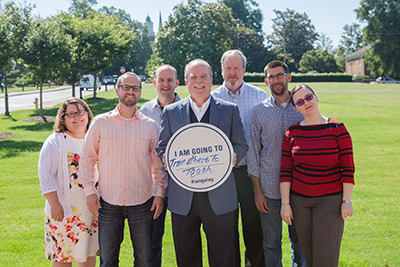Faculty Q&A with Ken Coley
January 19, 2017

 Ken Coley is the director of Ed.D. studies and professor of Christian education at Southeastern Baptist Theological Seminary (SEBTS). He shares how he trains upcoming teachers and leaders of Christian education.
Ken Coley is the director of Ed.D. studies and professor of Christian education at Southeastern Baptist Theological Seminary (SEBTS). He shares how he trains upcoming teachers and leaders of Christian education.
1. Tell us about yourself.
I grew up in Raleigh, North Carolina. I did my undergrad in English at Wake Forest University. During that time, I wrestled with my calling, specifically about if I was called to ministry, teaching or law school. I decided the Lord was leading me to teach. While teaching middle school and high school English in Virginia and doing my master’s in educational administration at William & Mary, I married my wife Kathy in 1975, and we moved to Maryland following the completion of my masters. God gave me the opportunity to use my love of teaching and my gift of administration to lead a Christian school and oversee a church Bible study program for 15 years. During this time period, I did my doctorate at the University of Maryland in school leadership. My wife and I have two kids, Scott and Caitlin.
2. How did you come to SEBTS?
While I was working and studying in Maryland, I came to know Dr. Paige Patterson. He eventually recruited me to teach at SEBTS. We came in 1996.
3. What do you do at SEBTS?
My official title is “Director of the Doctorate of Education Program.” However, I primarily view myself as a teacher of teachers, and I train people to be more effective teachers. My second love is leadership, and I train people to be more effective leaders.
4. What have you been reading recently?
I’m doing a lot of reading on the “mind, brain, and education” research, otherwise known as “neuroscience.” I’m studying what is actually taking place in our brains when we are acquiring new information. Taking this back to teaching, I coach our students that teaching is the art of changing the brain.
5. When you get home from work, what do you look forward to doing? (What are your other passions?)
We have two German shepherds who love to play and can never get enough of it. I also love kayaking.
6. Who are your role models?
My high school social studies teacher modeled differentiated teaching techniques, and my religion teacher at Wake Forest modeled effective higher education teaching. Also, Dr. Patterson and Dr. Akin have taught me a lot about leadership.
7. What has God been teaching you lately?
He is teaching me to show up and find out what he wants me to do today. It seems paradoxical late in my career that I have the goal of daily obedience, but that’s what he’s showing me. He’s really teaching me the essence of 1 Peter 5, which tells you to humble yourself under the mighty hand of God. I tend to be a pretty “grab the bull by the horns” kind of guy, so the Lord is maturing me in that a good bit, too.
8. Where are some of your former students?
It brings me so much joy to know that we have students in all sorts of areas. We have students in higher education. We have a college president. We have deans of colleges, teachers, pastors, denominational leaders and more. Our degree has a very broad appeal.
9. When a student completes your program, what do you want him or her to walk away with at the end of the program?
Really, it all boils down to 2 Timothy 2:2, which says, “The things which you have heard from me in the presence of many witnesses, entrust these to faithful men who will be able to teach others also.” Our graduates have the knowledge, skills, and passion to model effective teaching, leadership and problem solving.
10. We always say that every classroom at SEBTS is a Great Commission classroom. What does that look like for your class?
We encourage our students toward a lifestyle of discipleship and spiritual formation. We are always asking the question, “How can we have our students mature in their own walk with the Lord and then take that discipleship to the nations?” All of the professors in our program have local and international experience in sharing the Gospel and training others. I have been blessed to minister in Cuba, Mexico, Haiti, Panama and the Congo. All of these experiences are woven into my class presentations.